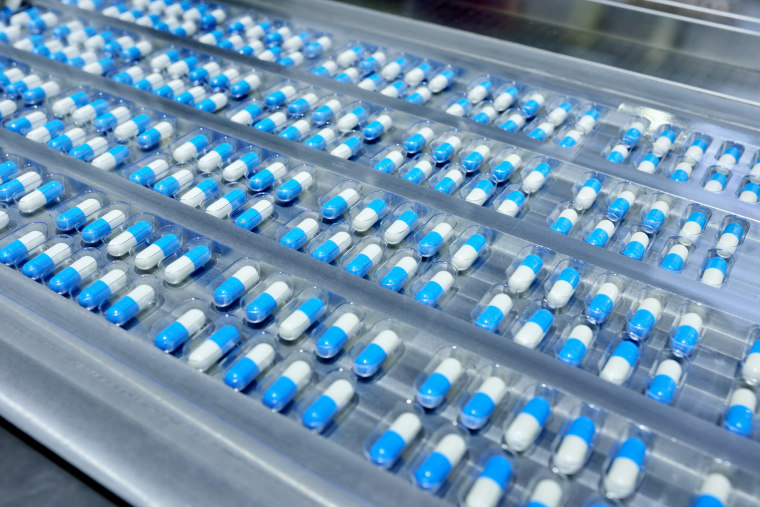Four pharmaceutical companies have filed hundreds of patents to keep their drugs out of the hands of generic competition and prolong their "unprecedented profits," according to a report published Thursday.
The excessive use of the patent system — by drugmakers Bristol-Myers Squibb, AbbVie, Regeneron and Bayer — keeps the prices of the medications at exorbitant levels, often at the expense of American consumers, according to the report from the Initiative for Medicines, Access & Knowledge, or I-MAK, a nonprofit organization that advocates drug patent reform.
“They get the power, they get the monopoly and they start hiking their prices,” said Priti Krishtel, a health justice lawyer and a co-founder of I-MAK.
The U.S. patent system is meant to reward innovation by permitting drug companies to sell new medications on the market and barring other manufacturers from making generic versions for a set period of time — usually 20 years. Once the patent expires, generics are allowed on the market, often at a lower list price than the brand-name drug.
But drugmakers often extend their patents by making small tweaks to the drugs, sustaining their monopolies for several years.
Legal experts refer to this tactic as “evergreening,” said Stanford University law professor Mark Lemley, who was not involved with the I-MAK report.
It's an approach seen across the pharmaceutical industry: drug companies file, on average, more than 140 patent applications per drug, according to the I-MAK report. Out of those patent applications, 66% of them were filed after the Food and Drug Administration approved the drug to be on the market.
These extra patents are “absolutely” to extend their monopolies, said Arthur Caplan, the head of the Division of Medical Ethics at NYU Langone Medical Center.
While the practice of evergreening isn’t necessarily illegal, said Caplan, who was also not involved with the report, it is unethical. “It’s clear that the system is being manipulated and we need to be rethinking the rules of patenting.”
Tahir Amin, an intellectual property researcher and a co-founder of I-MAK, put it bluntly: “Companies are gaming the system.”
Because of this, advocates say reforming the patent system is an important next step in the nation’s efforts to curb sky-high drug prices. Last month, President Joe Biden signed the Inflation Reduction Act into law, which lowers prescription drug costs for patients on Medicare but leaves out millions of Americans on private insurance and the uninsured.
Extended patents and legal battles
The new report highlighted the patenting practices on a handful of blockbuster drugs.
Revlimid, a multiple myeloma drug made by the New York-based company Bristol-Myers Squibb, generated $8.7 billion in annual sales in 2021, representing 30% of the company’s overall revenue, according to the report. The original patent on the drug expired in 2019, but the drugmaker won't face competition until 2026.
At least 206 patents have been filed on the drug, which Bristol-Myers acquired through its acquisition of the drugmaker Celgene in 2019. Nearly three-quarters of those patents were sought after it was approved by the FDA in 2005, the report found.
Humira, a rheumatoid arthritis drug from the Chicago-based biotech firm AbbVie, generated $17.3 billion in annual sales in 2021. There are 311 patent applications for the drug, 94% of which were sought after FDA approval. AbbVie's original patent on the drug expired in 2016, but it won't face competition until 2023.
Eylea, a medication for vision problems including age-related macular degeneration from Regeneron and Bayer, has 134 patent applications, 65% of which were sought after the drug was approved in 2011. It generated $5.8 billion in annual sales last year. Its exclusivity is set to expire in 2023, but it's unlikely to face competition soon, according to I-MAK. That's because some of its additional patents on the drug don't expire until 2040.
Bristol-Myers Squibb, AbbVie, Regeneron and Bayer did not respond to requests for comment.
The practice of extending patents doesn't always go unchallenged. In some cases, generic manufacturers sue the drugmakers to get their drugs on the market, Lemley said. However, he added, those lawsuits often end in settlements between the companies.
On Monday, Gilead Sciences announced a settlement with five generic drugmakers over its blockbuster HIV drugs Descovy and Odefsey, as well as the hepatitis B drug Vemlidy. The two HIV drugs had faced generic competition as soon as 2025, but the settlement delayed the arrival of generics until 2031.
Settling the lawsuit is “essentially paying the generic to go away,” Lemley said.
The settlements are anti-competitive, Caplan said, because the drugmakers are paying to eliminate competition.
The United States Patent and Trademark Office (PTO), which grants drugmakers the patents, has said it is working to prevent drug companies from unjustifiably delaying generic competition.
A spokesperson for the office didn't have an immediate statement on the report, but pointed NBC News to a July blog post written by PTO Director Kathi Vidal and FDA Commissioner Dr. Robert Califf. It detailed how the agencies are developing policies aimed at preserving the U.S. patent system while advancing competition that can lower drug prices.
While the patent system is important to incentivize innovation for new medicines, it "must not be used to unjustifiably delay generic drugs and biosimilar competition beyond that reasonably contemplated by law," they wrote.
In the meantime, Caplan said he expects to see more litigation from the Department of Justice challenging the extra patents from drug companies.
Krishtel of I-MAK said the federal government should also begin taking a more critical look at what patents are being filed and perhaps "raising the bar" for what is considered an improvement to a drug.
Follow NBC HEALTH on Twitter & Facebook.

